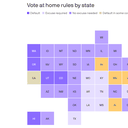The race to change how America votes

Published Date: 3/31/2020
Source: axios.com
Data: RepresentUs and NCSL; Chart: Naema Ahmed/AxiosWith in-person elections on Nov. 3 the hope but no longer a certainty, states are racing to chip away age-old barriers to alternatives in time for the general election.Why it matters: State laws and political calculations remain formidable obstacles to expanding voting options. And the price tag for changes could top $2 billion."The more people who vote early or vote by mail means fewer people standing in line on election day," California Secretary of State Alex Padilla told Axios.State of play: Twelve states still don't let all voters cast ballots by mail. Massachusetts may not have time to change its state constitution to allow for more people to vote from home, a spokesperson for the Massachusetts State Department told Axios' Dan Primack. The spokesperson said they hoped the state legislature could figure out a fix.Alabama, Delaware, Kentucky and Connecticut require specific excuses to vote absentee and do not as of yet have early voting options in place for the general election. North Carolina last year made their absentee ballot rules stricter.But because of the coronavirus, all 50 states have declared state or public health emergencies, according to the National Governors Association (NGA) — and that's allowing some states to delay some election-related timing and change polling locations.Virginia previously didn't allow vote-by-mail without an excuse. A new law will allow no-excuse absentee voting in November, and a temporary measure also allows it for local May elections. Additionally, West Virginia, Indiana, Alabama and Delaware are temporarily allowing anyone to vote absentee in elections this spring and summer because of the coronavirus — but that hasn't yet been extended to November. They're among 17 states that typically demand specific reasons for voting by mail.Meanwhile, frustrations over delayed action have prompted lawsuits in several states. Multiple lawsuits have been filed in Wisconsin, per the Milwaukee Journal Sentinel.Texas Democrats are seeking to expand an existing vote-by-mail law that allows residents to vote by mail if they're disabled. The state Democratic Party filed a lawsuit on March 20 to change the vote-by-mail laws because of the coronavirus. A report by the Brennan Center for Justice, a left-leaning nonprofit, recommends expanding early voting and giving everyone the option of voting by mail, along with setting up safe polling places and expanding online registration.Democratic Sens. Amy Klobuchar and Ron Wyden want legislation pushing states to allow mail-in voting for all voters without an excuse — but key Republican senators haven't embraced it.A Senate GOP aide told Axios that Republicans have supported bills that provide states funding for improving and strengthening elections but think decisions on election processes should be left to state and local officials."Most states have many of the measures that Democrats wanted to force in a top-down federal approach," Rep. Rodney Davis (R-Ill.) told Axios. Some Democrats think higher voter turnout would help them. But various reports suggest vote-by-mail increases could benefit Democrats or Republicans.The other side: Forty-one states now have some form of early-vote options, either by mail or in person. And 34 states will allow for absentee voting without an excuse in November, five of those automatically sending every voter a mail-in ballot.Jack Noland, research manager at RepresentUs, which tracks absentee voting laws, said states that are changing have moved at a "rapid" pace — "a sign that folks are pretty concerned and taking this seriously."States are looking at other elections changes as well, Paul Pate, Iowa's secretary of state and the president of the National Association of Secretaries of State, told Axios.Iowa is consolidating voting precincts to reduce the number of poll workers, who tend to be older and thus at higher risk.States are also considering extending early-voting periods and moving voting locations away from vulnerable populations.Be smart: Despite speculation the general election could be suspended or delayed, bipartisan officials say that's not going to happen. Per federal law, the general election is held "Tuesday next after the 1st Monday in November" of even-numbered years.President Trump can't change that, even in a national emergency. Only Congress could, and there's no prospect for that — especially under split-party control.